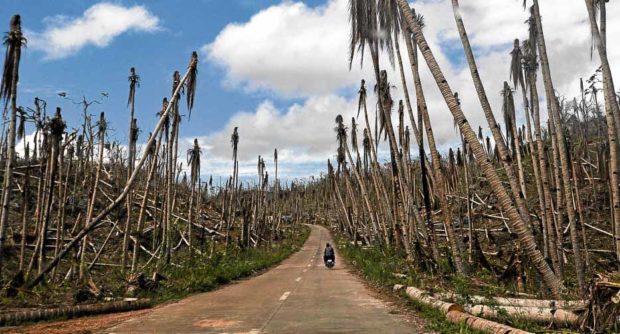PH warned anew of climate impact

FURY OF ‘YOLANDA’ A road in Guiuan, Eastern Samar, lined by damaged coconut trees in the aftermath of the 2013 typhoon. INQUIRER FILE PHOTO
MANILA, Philippines — Extreme sea level rise as the oceans further heat up and more intense cyclones threaten coastal communities around the world, including those in the Philippines, said a United Nations report that looked into the impact of climate change on the ocean and the cryosphere.
Released last week, the special report by the UN-backed Intergovernmental Panel on Climate Change (IPCC) warned of even more drastic consequences that the world will face due to the unabated warming of the ocean and the rapid thawing of the cryosphere, or the frozen parts of Earth.
While these impacts will be felt globally, the Philippines — an archipelago in the Pacific Ocean with far less adaptive capacity than developed nations — will surely bear the brunt of these extreme events, said Lourdes Tibig, the lone Filipino contributor to the report.
“Whatever permafrost thawing that had happened, it will affect us even if we are far away because it results [in] what we call as major contributions to sea level rise,” she said in an interview with the Inquirer during the report’s Philippine launching on Thursday.
“There could be areas that will be permanently inundated, especially the low-lying ones. Productive agricultural areas near the coast could also be saline because of the intrusion of sea water,” she added.
Without proper preparedness and access to resources, more human lives could also be put at risk, due to more severe tropical cyclones, similar to Supertyphoon “Yolanda” (international name: Haiyan) that battered Eastern Visayas in 2013.
“More intense storms may become the new normal,” Tibig said.
The report also projects that more extreme El Niño and La Niña would also likely intensify existing impacts, with drier and wetter events in several regions worldwide.
“With the ordinary [El Niño], we already find difficulty in adapting to it. What more if it becomes extreme?” Tibig said.
With these projections, coastal communities may suffer from a “triple whammy,” or compounded hazards that can happen simultaneously, with the threats of extreme sea level rise, El Niño and stronger storms ahead, she noted.
The report was the third to be released by the IPCC, a UN-backed body that assesses the science related to the changing climate.
More than 100 scientists from 36 countries worked on this report on the ocean, citing nearly 7,000 scientific papers and eliciting more than 31,000 comments during the reviews.
The report observed that the global ocean, which is considered a major carbon sink, has already taken up over 90 percent of the world’s excess heat since the 1970s. Scientists noted that its rate of warming has doubled since 1993.
Marine heat waves, or periods of extremely high ocean temperatures, have already adversely impacted marine organisms and ecosystems, as well as “critical foundation species,” including corals, seagrasses and kelp.
Tibig said these could ultimately threaten the country’s livelihood and food security, as many Filipinos depend on the ocean and the seas for catch.
“There could be decreasing fish catch potential because fish usually stay away from warm waters and seek colder temperatures,” she said. “The common observation now is that our fishermen need to go farther out to sea for better catch.”
With this grim scenario, abrupt changes in the ocean and cryosphere can still be dealt with through reduction of greenhouse gas emissions globally, the report said. In managing these risks, “transformative governance” is needed, which would integrate a variety of strategies and benefits to help reduce the risks posed by compounded events.
For the Philippines, Tibig said policymakers should listen to the science in the report and push for more integration of climate actions that would go beyond the time frame of their political positions.
“The government should really push for more ambitious targets in terms of adaptation and mitigation, because adaptation is not enough,” she said. “Ecosystem-based adaptation… should be in conjunction with mitigation or reduction of emissions.”
The special report should also push the government to invest more in research and studies to fully understand the risks faced by the country, particularly for coastal areas threatened by sea level rise, said Denise Fontanilla, associate for policy advocacy of the Institute for Climate and Sustainable Cities.
“There’s such a lack of research and information,” she said. “We need to know what the impacts truly are of climate change on our coastlines and coastal village. [Right now,] we see a huge gap in the collection of data.”